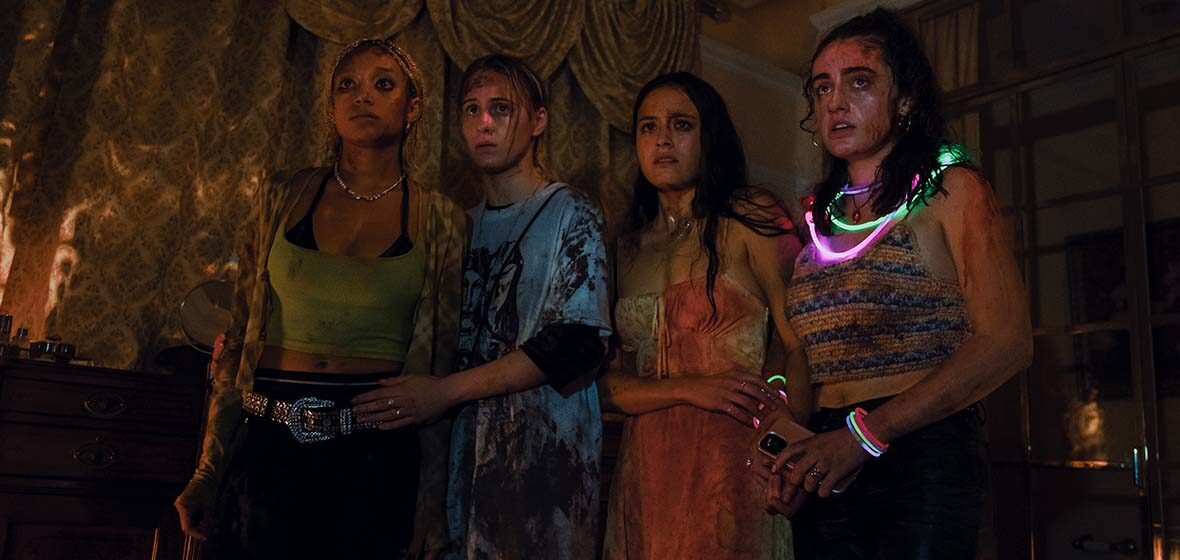4 out 5 stars
For a generation mostly educated by visual media, millennials don’t translate to film that well. Or maybe filmmakers haven’t yet found the best way to shoot modern times in a compelling and cinematic way. Don’t you flinch when a film tries to represent late millennials and zoomers as a non-diversified monolith of spoiled, asexual, sensitive egoists who speak in memes in between scoffing ADHD medication? This is a strange and yet understandable phenomenon. Millenials are the first generation with a presence in the digital landscape that was raised on media made for the analogue era.
In my opinion, only two pieces of screen art have got it right thus far. The first is Search Party, the formidable television show by Michael Showalter about four friends in New York trying to find a lost girl. It’s an acerbic satire that also understands and cares for its subjects and allows them to behave naturally without the filmmaker obsessing about the quirks of their generation.
The other is Bodies Bodies Bodies. This is a film so modern that it’s partly lit by the glare of mobile phones and glow sticks.
This amusingly titled work is about a group of friends who host a party in a mansion during a hurricane. Geared up with the essentials (alcohol and drugs), they indulge in revelling and excess until one of them turns up dead in mysterious circumstances, the situation mimicking a party game the group played earlier in the evening (called, yes, Bodies Bodies Bodies). The friends’ panicked reaction unleashes a spiral of accusations, paranoia and violence, exacerbated by each having to respond to the blood-drenched trauma with the very limited resources allowed by their own overriding egoism.
The one most burdened by this chaos is Bee (Maria Bakalova), the new girlfriend of Sophie (Amandla Stenberg), who has returned to see her friends after doing time in rehab. The rest of the group comprises Sophie’s ex-boyfriend and owner of the mansion, David (Pete Davidson), his girlfriend Emma (Chase Sui Wonders), Alice (Rachel Sennott), who brought along Greg (Lee Pace), a 40-year-old man everyone else is uncomfortable around, and the only single in the group, Jordan (Myha’la Herrold).
While everyone else is from an affluent family — especially Sophie and David — Bee isn’t as opinionated or arrogant as the others and can’t hide her discomfort with the overall opulence. She’s out of her element, and as such functions as a conduit for an audience that may be alienated by the overindulgence of the setting.
The film earns a gold star as soon as the plot kicks off. The lights go out, everyone is stuck indoors (most of them high on pills and cocaine), and the paranoia takes its expected course. It’s a great concept that the writing team, Sarah DeLappe and Kristen Roupenian, deliver, giving the actors some wonderfully natural dialogue. And director Halina Reijn makes the most of it, framing the film with the aggressiveness of a selfie and using practical, diegetic light to the best effect.
The result is not only hip and cool, but also highly entertaining. The demise of the friendship group — foreshadowed, when they play the drinking game, by the statement that “people always cry when we play this” — works because they all deserve it. There’s a poignant moment where, after another friend shows up dead, the discussion leads to confessions about mental illness. Other than Bee, no one is capable of compassion or any expressions of fellow-feeling other than those reflect positively on themselves. So maniacally self-centred are the other characters that part of the fun for the audience is witnessing them break apart without their ever noticing how their issues could be resolved.
So the satire is there, but, if anything, doesn’t go far enough. Bodies Bodies Bodies is underpinned by an understanding that the significant social gap between young millennials and zoomers is never addressed when these groups are represented in pop culture. Bee’s character presents an opportunity to dig deep into the notion of the dehumanisation of privilege. Still, that fundamental theme remains on the surface in this film. It’s a great pity, because besides being the entertaining romp it is, a film like Bodies Bodies Bodies could have been elevated to classic status had it examined all the layers of its subjects. The satire is flimsy: the film both loves and mocks its protagonists, but sadly it doesn’t allow itself to make us of the more cerebral opportunities the script offers.
In short, this film is almost Jean Renoir, almost Luis Buñuel — stylised and satirical — but falls short, given its leaning towards the superficial.
All of this is perfectly represented by the ending: the intended moral of Bodies Bodies Bodies is prefigured by the ironic twist halfway through the film. And Bodies Bodies Bodies, with its effortless creation of a new cinematic language, still makes for one of the most enjoyable and entertaining cinema experiences this year.




